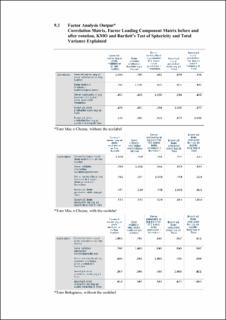| dc.description.abstract | This thesis examines the effect of a brand-issued carbon label on brand attitude, purchase
intention and perceived product quality on the consumer. These effects are hypothesized to be
moderated by the perceived fit between the eco-labeled pre-packaged meals and the product
category (vice or virtue). Based on the literature, we argue that virtue foods have a better fit
with eco-labeled foods, and therefore the ecolabel would have a significant positive effect on
brand attitude and perceived product quality. Due to the low fit between the vice product
category and eco-labeled food, we hypothesize a negative effect on brand attitude and
perceived product quality. Further, we hypothesize that brand attitude and perceived product
quality both significantly affect purchase intention.
The thesis provides insight to the changes in consumer responses, and contrary to our
hypotheses, finds that even though brand attitude and perceived quality both are positive and
significant, the consumers do not reward the company with significantly higher purchase
intentions. The hypotheses about fit are also disregarded, as both vice and virtue foods gained
positive and significant effects on brand attitude and perceived product quality when the label
was included.
For marketing managers, and other strategic decision-makers in a company, our findings
indicate that investing in an ecolabel does not immediately contribute to higher sales. However,
there might be other benefits that surpass the quick reward of purchase intention the moment
the ecolabel is introduced. As perceived product quality increases when the ecolabel is placed
on the product, the brand status might be elevated in the mind of the consumer, and the
ecolabels’ positive effect on brand attitude could be an asset for the brand.
Depending on the managers’ strategic goals, an ecolabel may or may not be a good investment
for the brand, as the return on investment cannot be found in the immediate purchase intention,
but rather in a general heightened appraisal of the brand and the perceived product quality.
However, as is so often the case with marketing efforts, branding is a long game, and it is often
hard to instantly quantify the results and return on investment. | en_US |

